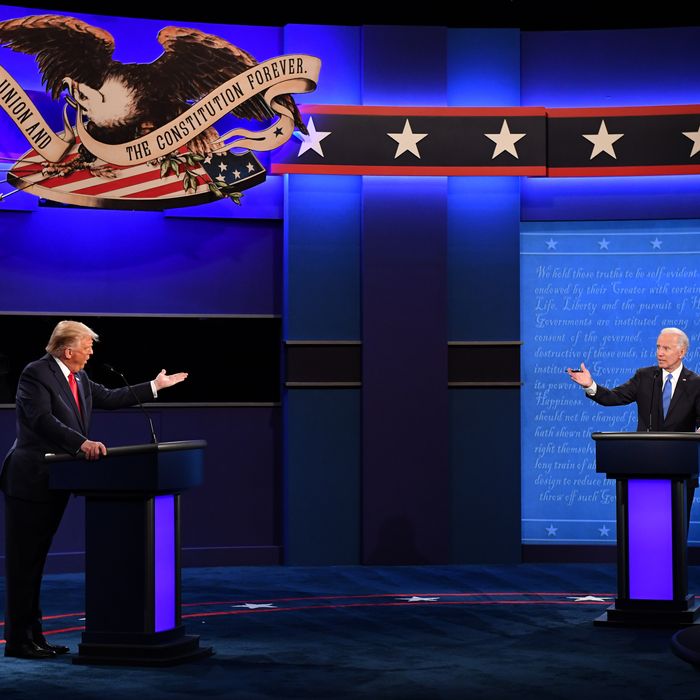
On Thursday evening, Donald Trump officially began walking one of the most perilous tightropes in American political history.
After he broke the widely expected news of his federal indictment, Trump once again, and predictably, began railing against the Justice Department. He is now facing his most serious legal threat and clearly views this antagonistic posture as essential to his reelection effort, which, if successful, could effectively moot whatever happens in this prosecution come January 2025, including a conviction. This same posture, however, threatens to make both his legal situation and reelection prospects worse.
At the moment, we are operating in a major informational vacuum, despite the reporting overnight about the nature of the charges, which are said to be violations of the Espionage Act over retaining national defense secrets, making false statements to investigators, and a conspiracy to obstruct justice. We do not have the indictment, and we may not see it until Trump is arraigned in Miami on Tuesday. The situation is quite distinct from where we found ourselves in the days immediately after we learned that Trump had been indicted by the Manhattan district attorney’s office but before the indictment became public. The reason is that some members of the media had (through their reporting) developed a very clear understanding of what the charges would be — both as a legal and factual matter — before the indictment was publicly released. In the few intervening days in that case, many people speculated (or perhaps hoped) that the charges might be more expansive and damning than they ultimately were — dozens of charges tied pretty much exclusively to the hush-money payment to Stormy Daniels.
The media, to be blunt, does not have that same level of insight this time around. There has, of course, been a great deal of reporting on the documents at Mar-a-Lago since the FBI’s search last August, but we are largely in the dark on some of the most important questions.
First and foremost, what was actually in the documents that Trump took and refused to return, and what was he doing with them? Overnight, for instance, the New York Times observed that while “the nature of a few of the documents found in Mr. Trump’s possession is known — he had held onto letters from the North Korean dictator Kim Jong-un, for example — it remains unclear what other classified materials were found at Mar-a-Lago and moreover what, if any, damage to national security his possession of them caused.” We will hopefully get greater clarity on this front either from the indictment or from early court filings from the government, but the answer could have major implications for how the American public, the court system, and the media ultimately process the allegations.
Already, Trump and some Republicans have sought to portray the indictment as part of a Democratic plot to “weaponize” the government against him, but the reality is that neither Joe Biden nor Attorney General Merrick Garland, who would have signed off on Special Counsel Jack Smith’s decision to bring charges, wanted to be in this position. On the campaign trial and following his election, Biden repeatedly indicated that he did not want to see his administration prosecute Trump. By all outward appearances, Garland was of the same disposition. As I reported a profile of the attorney general earlier this year, that came through even more clearly: Garland came into office hoping to avoid a direct confrontation with Trump and a historically unprecedented prosecution that could sharply divide an already fractured country.
Things clearly did not work out that way, and though there is much to learn about how we got to this point, the blame for this ought to be laid first and foremost at the feet of Trump. Whatever the merits of the prosecution — which will no doubt be intensely debated as we learn more — he brought it upon himself. He and his lawyers had multiple opportunities to resolve this mess and return the documents without prosecution, and they seemed to delight in blowing right past them at every opportunity. As a legal matter (at least with the benefit of hindsight), their handling of the situation was incredibly stupid.
In an ideal world, GOP primary voters would see right past all of this and nominate someone else as their standard-bearer for the 2024 election. That would at least eliminate the prospect of Trump coming back to power, which, first, would lead to him certainly either stopping the prosecution or even pardoning himself after a conviction. Second, it could yield an aggressive campaign of prosecutorial retribution from his Justice Department that would target officials at the DOJ and the FBI who have been involved in investigating and now prosecuting him.
A loss for Trump in the primary would not entirely forestall some of these consequences: If Biden ultimately loses to another Republican, that person may very well pardon Trump anyway. (Ron DeSantis did not go so far in a statement last night, only vowing “accountability” for the DOJ if he is elected.) In fact, this question — would the Republican candidates pardon Trump? — is now about to become a major one in the primary.
Trump is walking a tightrope now, but so too is Biden, in his own way.
If the charges against Trump are legally and factually compelling, then Garland and Smith will have done the country a considerable service by finally breaking the norm of elite political impunity that has conspicuously and regrettably governed the country for the last half-century since Richard Nixon was pardoned by Gerald Ford to ensure he would not be prosecuted over the Watergate cover-up.
This prosecution, however, almost certainly will not be over by the time of the general election next fall. In ordinary circumstances, you would expect a complex, high-profile prosecution to take — from start to finish, including appeals — two to three years. Even if a trial manages to take place next year and Trump is convicted, there will undoubtedly be appeals, and Trump would likely be allowed to remain free while that process unfolds, perhaps even actively campaigning on how he should be reelected so that he can pardon himself and prosecute Biden for some reason or another.
As a practical matter, that means that the result of the presidential election will also control whether this prosecution reaches an orderly resolution. After the Manhattan charges were filed, Biden stayed far away from commenting on Trump’s case and he’s likely to do so in the near term over this indictment. But this will not be tenable so long as Trump is a candidate. As a result, the Biden campaign will have to defend this project and the underlying principles that they reflect, whether they like it or not, which will put them in the strange — and yes, again, unprecedented — position of having to support the prosecution of the sitting president’s most significant political rival, the very thing that Biden hoped to avoid upon entering office.
How significant this will all prove to be during campaign season is, of course, an open question. The indictment in Manhattan basically came and went, with many initial boosters of the effort seemingly moving on after they finally saw the charges and the ultimately ambivalent public reaction.
The same could happen here depending on the nature of the federal charges, to say nothing of potential state and federal charges over Trump and the 2020 election. But for now, we are witnessing one of the most complex and consequential legal and political battles of our lifetimes — one with a shockingly wide spectrum of possibilities for how it all shakes out.
More on Trump’s Indictment
- Biden Needs to Talk About the Trump Prosecutions Before It’s Too Late
- Trump Used Classified Documents As Scrap Paper
- The Case(s) Against Donald Trump






























